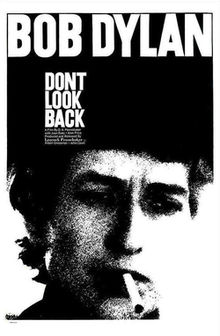Bob Dylan is celebrated far and wide for his sense of enigma. It draws many fans to him like a magnet — the fact that he rarely, if ever, reveals details of his personal life, the impenetrable nature of his ever-changing persona. In fact, I actually went to see him in concert this October, and I was surprised by the fact that he didn’t say a single word outside of the songs that he played. This mystery is a trait that he carries even to this day, and it can be traced all the way back to the very beginnings of his fame in the 1960s.
Dont Look Back, a 1967 documentary focusing on his 1965 tour of London, England, brings its audience closer to Dylan — the “real” Dylan, if there is such a thing — than any of them are otherwise likely to get. This Dylan is striking, more than anything, because he wavers so much between different facades. At times he is visionary, playing guitar and singing straight from his heart, or talking honestly with people who see life differently from him; at other times he is downright arrogant, interrupting people often and discounting their opinions in favor of his own. Sometimes he is quiet and attentive, carefully listening while fellow musicians like Donovan and Joan Baez play music for him in hotel rooms; sometimes he is loud and angry almost to the point of not making sense, like when he demands to know who in his hotel is guilty of throwing glass into the street. He’s humble and down-to-earth, but also remarkably full of himself (“I know I’m big noise,” he taunts to a man he has accused of being guilty of the glass-throwing). Sometimes he’s very serious, and sometimes he grins and makes jokes — and what’s more, he’ll often switch between many of these attitudes within the span of a single minute.
Of course, many of these less endorsable sides of Dylan — that he is argumentative, acerbic, full of himself, etc. — are traits that a great deal of his fans will easily dismiss. They’ll say, “That’s just the way he is,” or, “That’s what makes him so great — he’s not afraid to tell people how it is!” Luckily, the film itself takes no sides; with no retrospective voiceover or imbalance regarding what footage it decides to show us, it is indiscriminate. It leaves its audience to make their own decisions.
The crowning achievement of Dont Look Back, then, is that it’s honest. It gives fans an inner look at everything they love about Dylan — the ways in which he can be at once relatable and completely, untouchably elevated — while refusing to shy away from the paradoxes of his character that at times can undercut this. I’ll admit feeling a personal pang of anger during a moment in the movie when Dylan tells a reporter something on the lines of, “I know more about you and your profession, just now from meeting you, than you will ever know about me.” But I also laughed anytime Dylan told a joke, and watched breathlessly during recordings of his live performances of songs like “It’s All Over Now, Baby Blue” and “Talkin’ World War III Blues”.
Dont Look Back was filmed at the height of Dylan’s fame and at the cusp of some of his most major creative breakthroughs (a.k.a., his 1967 triple-album win with Bringing it All Back Home, Blonde on Blonde, and Highway 61 Revisited). It situates us directly in Dylan’s touring life, to the point that we feel like we’re actually sitting where the camera operator is sitting, three or four feet away from him. It is arguably the closest any film has ever or can ever really come to penetrating the eternal mystery and captivating persona of Bob Dylan, for better or for worse.




